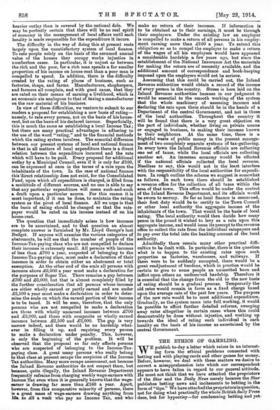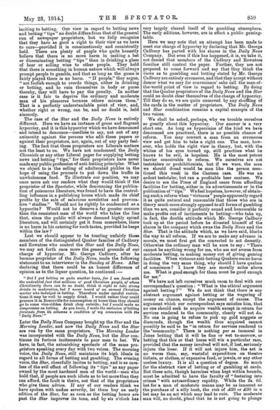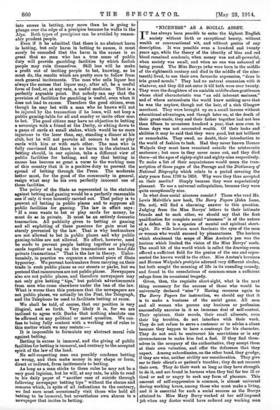THE ETHICS OF GAMBLING.
WE publish to-day a letter which raises in an interest- ing form the ethical problems connected with betting and with playing cards and other games for money. Before, however, we deal with these matters we desire to correct a misapprehension into which our correspondent appears to have fallen in regard to our general attitude. He must not think that we have attacked the proprietors of the Star and the Daily News merely because the Star publishes betting news and incitements to betting in the form of "tips." We have attacked the proprietors in question, not for doing what practically the whole British daily Press dees, but for hypocrisy—for condemning betting and yet
inciting to betting. Our view in regard to betting news and betting " tips " no doubt differs from that of the general run of newspaper proprietors, but we fully recognize that they have as good a right to their view as we have to ours—provided it is conscientiously and consistently held. There are plenty of people who quite honestly believe that there is no more harm in making a bet or disseminating betting "tips " than in drinking a glass of beer or selling wine to other people. They hold that there is something in human nature which will always prompt people to gamble, and that as long as the game is fairly played there is no harm. " If people," they argue, "are foolish enough to overdo things, either in drinking or betting, and to ruin themselves in body or purse thereby, they will have to pay the penalty. In neither case is it fair to deprive the ordinary and moderate man of his pleasures because others misuse them." That is a perfectly understandable point of view, and, whether right or wrong, can be, and no doubt is, held sincerely. The case of the Star and the Daily News is entirely different. Here we have an instance of gross and flagrant hypocrisy, and it is this hypocrisy which we have denounced and intend to denounce—needless to say, not out of any animosity against the persons who edit these papers or against their proprietors, nor, again, out of any party feel- ing. The fact that those proprietors are Liberals matters not the least to us. We have not condemned the Daily Chronicle or any other Liberal paper for supplying betting news and betting •• tips," for their proprietors have never made any public profession of anti-betting principles. What we object to is the selling of adulterated pickles in the hope of using the proceeds to put down the traffic in unwholesome food. To illustrate our position, we may once more ask our readers what they would think if the proprietor of the Spectator, while denouncing the publica- tion of poisonous literature, was found to have the control- ling influence in a publishing house which made its chief profits by the sale of salacious novelettes and provoca- tive "studies." Would not he rightly be condemned as a hypocrite ? Would not he deserve a far greater censure than the consistent man of the world who takes the line that, since the public will always demand highly spiced literature, and will certainly get it from somewhere, there is no harm in his catering for such tastes, provided he keeps within the law ?
Lest we should appear to be treating unfairly those members of the distinguished Quaker families of Cadbury and Rowntree who control the Star and the Daily News, we may set forth once more the general grounds of our charge of hypocrisy. Mr. George Cadbury, after he became proprietor of the Daily News, made the following statement to an interviewer in the Sunday at Home. After declaring that there could be an honest difference of opinion as to the liquor question, he continued But I put betting on quite another basis, for I am faced with the undoubted fact that millions of good Christian people, of whose Christianity there can be no doubt, think it right to take strong drinks in moderation, but I never heard of an earnest Christian worker who indulged in betting. Therefore under careful restric- tions it may be well to supply drink. I would rather they could procure it in Bournville for consumption at home than they should go to some vice-ridden drink shop outside ; but I would make no compromise on betting. As you know, I make the exclusion of betting forecasts from its columns a condition of my connexion with the Daily News.'" Later the Daily News Company bought up the Star and the Morning Leader, and now the Daily News and the Star are run by the same proprietors. The Morning Leader was incorporated with the Daily News, but the Star con- tinues its furious incitements to poor men to bet. We have, in fact, the astonishing spectacle of the same pro- prietors speaking every day with two voices. The morning voice, the Daily News, still maintains its high ideals in regard to all forms of betting and gambling. The evening voice, the Star, cheerfully incites to betting, and is as care- less of the evil effect of following its " tips " as any paper owned by the most hardened men of the world—men who hold that, if people are such idiots as to bet more than they can afford, the fault is theirs, not that of the proprietors who give them advice. If any of our readers think we have spoken with undue severity, let them buy an early edition of the Star, for as soon as the betting hours are past the Star improves its tone, and by six o'clock has
very largely cleared itself of its gambling atmosphere. The early editions, however, are in effect a public gaming- table.
Here we may note that an attempt has been made to meet our charge of hypocrisy by declaring that Mr. George Cadbury has parted with his shares in the Daily News Company. But even if this has happened, it is, we take it, not denied that members of the Cadbury and Rowntree families still control the paper. Further, they are not prepared to come forward and say that they think the views as to gambling and betting stated by Mr. George Cadbury are entirely erroneous, and that they accept without demur what we may for convenience' sake call the man-of- the-world point of view iu regard to betting. By doing that the Quaker proprietors of the Daily News and the Star could no doubt clear themselves of the charge of hypocrisy. Till they do so, we are quite unmoved by any shuffling of the cards in the matter of proprietors. The Daily News and Star combination remains a capital example of the two voices.
We shall be asked, perhaps, why we trouble ourselves so greatly about this hypocrisy. Our answer is a very short one. As long as hypocrisies of the kind we have denounced are practised, there is no possible chance of reform. You may convert a man from an erroneous view and get him to take a right one. The man, how- ever, who holds the right view in theory, but, with the whites of his eyes turned up, still practises what he knows to be evil, is hopeless. He is the most potent barrier conceivable to reform. We ourselves are not teetotalers or prohibitionists, but if we were, the men we should dread would be men like the person men- tioned this week in the Canteen case. He was an ardent teetotaler, but ran a profitable beer canteen. We desire to see the Press of England cease from affording facilities for betting, either in its advertisements or in the publication of " tips." We feel hopeless, however, of obtain- ing such a reform when " virtuous " people apparently regard it as quite natural and reasonable that those who are in theory much more strongly opposed to all forms of gambling than we are, consider it perfectly sound and honourable to make profits out of incitements to betting—who take up, in fact, the double attitude which Mr. George Cadbury took up at the period before he divested himself of the shares in the company which owns the Daily News and the Star. That is the attitude which, as we have said, blocks the way to all reform. If we are to make any advance in morals, we must first get the converted to act decently. Otherwise the ordinary man will be sure to say : " There cannot be anything wrong for me, who am not averse from moderate betting, in making money out of giving gaming facilities. When virtuous anti betting Quakers Beene harm in doing the very same thing, why should I haVe qualms of conscience ? I know they are morally miles above me. What is good enough for them must be good enough for me."
We have not left ourselves much room to deal with our correspondent's question: " What is the ethical argument against betting ? " We do not think that there is any abstract argument against betting or the wagering of money on chance, except the argument of excess. The argument which our correspondent says satisfies him, that no one should seek to acquire wealth except in return for services rendered to the community, clearly will not do. No one is going to refuse to pick up gold nuggets or diamonds, though the wealth thus acquired cannot possibly be said to be "in return for services rendered to the 'community." There is nothing per as immoral in Jones betting that it will be fine or wet to-morrow, or betting that this or that horse will win a particular race, provided that the money involved will not, if lost, seriously injure the loser. If it will not injure him, the act is no worse than, say, wasteful expenditure on theatre tickets, or clothes, or expensive food, or jewels, or any other useless luxury. It is all a question of degree. So much for the abstract view of betting or of gambling at cards. But these acts, though harmless when kept within bounds, must be admitted to have the faculty of "festering into crimes " with extraordinary rapidity. While the 2s. 6d. bet for a man of moderate means may be as innocent as the purchase of a silly book, the risk of £20 or .23D in a bet may be an act which may lead to ruin. The moderate man will, no doubt, plead that he is not going to plunge
into excess in betting, any more than he is going to plunge over the edge of a precipice because he walks in the Alps. Both types of precipices can be avoided by reason- ably prudent people. Even if it be admitted that there is no abstract harm in betting, but only harm in betting to excess, it must surely be conceded that the harm in the excess is so great that no man who has a true sense of public duty will provide gambling facilities by which foolish people may ruin themselves. Still less will he make a profit out of inciting people to bet, knowing, as he must do, the results which are pretty sure to follow from such general incitements. The man who sells liquor has always the excuse that liquor may, after all, be a useful form of food, or, at any rate, a useful medicine. That is a perfectly arguable point. But nobody can say that the provision of facilities for gambling is useful, even when it does not lead to excess. Therefore the good citizen, even though he may bet with a man who he knows will not be injured by the transaction if he loses, will not keep a public gaming-table for all and sundry or incite other men to bet. The good citizen may have no objection to betting a sovereign with a friend at the Derby, or sitting down to a game of cards at small stakes, which would be no more injurious to the loser than, say, standing a dinner at his club, but he will not provoke all comers to bet or play cards with him or with each other. The man who is fully convinced that there is no harm in the abstract in betting should, in our opinion, take a different view of public facilities for betting, and say that betting in excess has become so great a curse to the working men of this country that it is a positive duty to prevent the spread of betting through the Press. The moderate bettor must, for the good of the community in general, resign what may be his own perfectly innocent use of those facilities.
The policy of the State as represented in the statutes against betting and gaming would be a perfectly reasonable one if only it were honestly carried out. That policy is to prevent all betting in public places and to suppress all public facilities for gaming. The law in effect says:
If a man wants to bet or play cards for money, be must do so in private. It must be an entirely domestic transaction. All publicity given to betting or gaming and all exploiting of these passions for gain must be sternly prevented by the law. That is why bookmakers are not allowed to bet in public places and why public gaming-tables are not allowed. No effort, however, need be made to prevent people betting together or playing cards together as long as the transactions are bond-fide private transactions.' That is the law in theory. Unfor- tunately, in practice we organize a colossal piece of State hypocrisy. We prevent bookmakers from carrying on their trade in such public places as our streets or parks, but we pretend that racecourses are not public places. Newspapers also are not public places, and therefore newspapers may not, only give betting "tips," but publish advertisements from men who come elsewhere under the ban of the law. What is worse than this pretence that the newspapers are not public places, we actually let the Post, the Telegraph, and the Telephone be used to facilitate betting at races.
We shall be told, of course, that our position is very illogical, and so forth. Very likely it is, for we are inclined to agree with Burke that nothing absolute can be affirmed on any political or moral question. We con- fess to being fully content with a working set of rules in
this matter which we may restate:— • It is impossible to formulate any abstract moral rule against betting. Betting in excess is immoral, and the giving of public facilities for betting is immoral, and contrary to the accepted spirit of the law of the land.
No self-respecting man can possibly condemn betting as wrong, and then make money in any shape or form, direct or indirect, from incitements to betting.
As long as a man sticks to these rules he may not be a very good logician, but he will, at any rate, be able to read in his daily paper of " another case of suicide through following newspaper betting tips " without the shame and remorse which, in spite of all indications to the contrary, we feel sure must occasionally visit those who bold all betting to be immoral, but nevertheless own shares in a newspaper that incites to betting.
















































 Previous page
Previous page